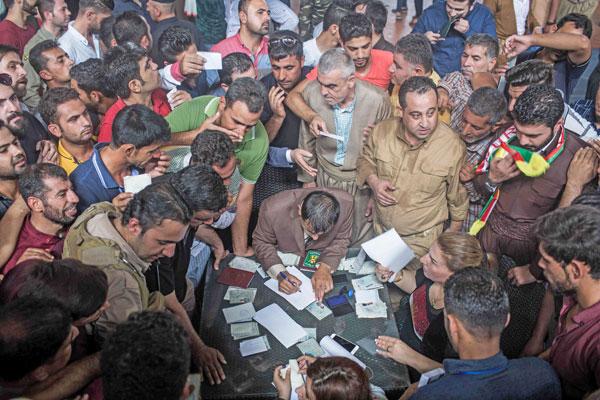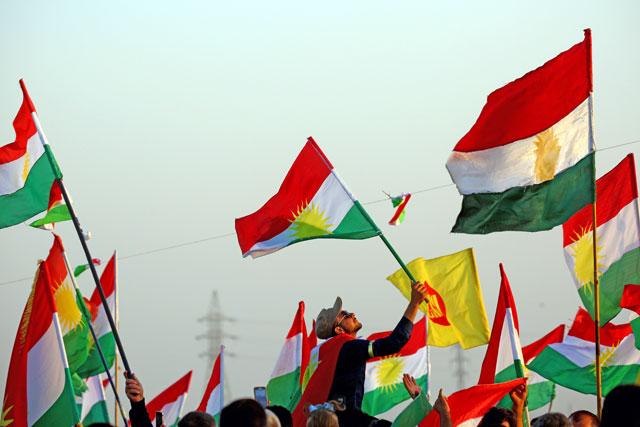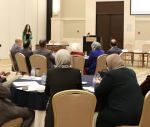You are here
Tensions rise as Iraq Kurds defy Baghdad in historic independence vote
By AFP - Sep 25,2017 - Last updated at Sep 25,2017

Iraqi Kurds celebrate with the Kurdish flag in the streets of the northern city of Kirkuk on Sunday, as they vote in a referendum on independence (AFP photo)
ERBIL, Iraq — Iraqi Kurds voted in an independence referendum Monday as tensions rose with Baghdad and neighbouring countries over the historic vote.
The referendum was proceeding peacefully but there were fears of potential unrest, especially after lawmakers in Baghdad demanded that troops be sent to disputed areas where the referendum was taking place.
As night fell, a curfew was imposed in parts of the disputed city of Kirkuk, police said.
Iran and Turkey, which both worry it will stoke separatist aspirations among their own sizeable Kurdish minorities, were also increasing pressure on Iraq's Kurds, with Ankara saying it would shut its border and threatening to block key oil exports.
An overwhelming "Yes" outcome is expected, but the vote is non-binding and Kurdish officials have said there are no plans for an immediate declaration of independence.
Voters were nonetheless flocking to the polls to pursue a long-cherished dream of statehood, and keen to show off their ink-stained fingers after casting their vote.
Kurdish flags were festooned in all streets, on cars and outside homes across Iraqi Kurdistan.
Voters headed to the polls early, many men dressed in traditional Kurdish dress of brown shirt and billowing trousers for the occasion.
“I came very early to be the first to vote for a Kurdish state,” Diyar Abubakr, 33, said outside a polling station in regional capital Erbil.
“It’s a day of celebration today. That’s why I’ve put on our traditional outfit, which I bought for the occasion,” he said.
Initial results are expected to be announced 24 hours after polls close.
Veteran Iraqi Kurd leader Massud Barzani, who initiated the vote, cast his ballot early in the morning, smiling and wearing a traditional outfit.
Polling stations are scattered across the three northern provinces of autonomous Iraqi Kurdistan — Erbil, Sulaimaniyah and Dohuk — as well as in disputed border zones such as the oil-rich province of Kirkuk.
In Sulaimaniyah, second city of the autonomous region, 40-year-old Diyar Omar came to cast his vote also wearing traditional clothes.
“We will seize our independence through the polls,” he said.
“I’m so happy I could take part in this independence vote during my lifetime.”
A total of 12,072 polling stations are open for more than 5.3 million registered voters.
Left without a state of their own when the borders of the Middle East were redrawn after World War I, the Kurds see themselves as the world’s largest stateless people.
The non-Arab ethnic group number between 25 and 35 million people spread across Iraq, Iran, Turkey and Syria.
Baghdad has declared the vote unconstitutional and parliament voted on Monday to demand Prime Minister Haider Al Abadi “deploy forces” in areas disputed with the Kurds.
Asked about the risks of armed conflict, Abadi’s spokesman Saad Al Hadithi told AFP: “If there are clashes in these zones, it will be the job of federal forces to apply the law.”
Kirkuk, home to Arabs, Kurds and Turkmen, has been a particular point of concern and late on Monday police said a curfew was being imposed in the centre of the city and in Arab and Turkmen areas “to ensure security, monitor the situation and protect the
citizens of Kirkuk”.
Abadi on Sunday pledged to take all the “necessary measures” to protect the country’s unity, as his government urged all countries to deal only with it on oil transactions.
The Iraqi Kurds export an average 600,000 barrels per day through a pipeline running through Turkey to Ceyhan on the Mediterranean.
Turkey’s President Recep Tayyip Erdogan on Monday threatened to halt these oil exports, angrily denouncing an “illegitimate” referendum.
Erdogan also said Turkey’s Habur border crossing with Iraqi Kurdistan would be closed.
He again urged Iraqi Kurdish authorities to take a step back and appeared to threaten a possible cross-border operation.
“In Iraq, when necessary, we will not shy away from taking these types of steps,” Erdogan said, referring to Turkey’s military operation launched last year in Syria against the Daesh terror group extremists and Syrian Kurdish militia.
Tehran has also increased pressure, announcing on Sunday it had blocked all flights to and from the region at Baghdad’s request.
The foreign ministry in Tehran said its land border with Iraqi Kurdistan remained opened however, reversing an earlier statement.
The United States and other Western nations have raised concerns about the vote, saying it could hamper the fight against Daesh extremists in which cooperation between Baghdad and the Kurds has been key.
Related Articles
ERBIL, Iraq — Iraq’s Kurds were Tuesday expecting the announcement of a big “yes” vote for independence, as authorities in Baghdad weighed h
ERBIL, Iraq — Iraq’s Kurds faced the threat of growing isolation Thursday after a massive “yes” vote for independence in a referendum that h
SULAIMANIYAH, Iraq — Iranian and Iraqi forces staged joint military exercises on Monday near the border with Iraq's autonomous Kurdistan reg

















